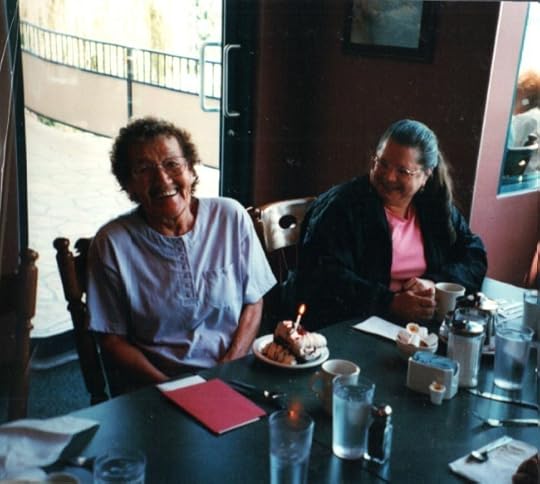What Might Have Been
Today would have been my mother’s 87th birthday had she not passed away in February after a brief illness. A few days ago I wrote this essay about her, both as a person and a mother. After writing it I realized it would be difficult to publish anywhere because people would condemn me for not being more tolerant or harboring bitterness, although that’s really not what it’s about. I learned a lot from my mother, and I miss her more than I ever thought I would. She was a difficult, complicated woman, and so much of my grief comes more from “what might have been,” than that she is no longer around to talk with and share things.
There aren’t too many people who would disagree that our parents, or whoever raises us, form the framework of our character. Outsiders may influence us, but whether your father was a deadbeat dad, or your mother received the “Mother of the Year Award,” you grow up to be who you are, good or bad, largely due to your upbringing.
My mother could be a kind woman, but her kindness came with a caveat: You must remember that kindness and mention it every time you saw her. On the other hand, anything you did for her was virtually ignored, or downplayed to the point you regretted the gesture. Last Mother’s Day when I called to wish her a happy day the shocking response I received was, “Mothers are for shitting on.” I still have no idea what event brought that on. Imagined slights were the norm rather than the exception for mom, and she carried grudges as if they were her offspring.
When people ask me if she was still alive when my novel was published I tell them no, but I don’t have regrets that she wasn’t able to enjoy my success. Other published projects of mine were dismissed, or somehow downgraded, to the point I felt embarrassed that I’d shared them. My weekly phone calls, after the obligatory inquiry about her health, deteriorated to become a diatribe about one of my siblings, or their spouses, and how they had hurt her in some mysterious way.
Despite her animosity toward just about everyone she encountered, neighbors and even strangers, treated her with kindness. She was fortunate to be able to stay in her home of twenty-five years up until the last week before her death. Neighbors would bring her home cooked meals, baked goods, and fruit from their gardens. When they’d gone she’d threaten to throw them away (unless I was able to intercept first) and complain that the offerings made her sick. In truth, she’d often eat the stuff in secret, then rave about how good they were.
During my nearly thirty-year marriage to a surgeon, she never gave up complaining about the evils of doctors and the medical profession. After my divorce, my ex became a saint, and in her opinion I’d been stupid to leave him. She’d lost her status in the community, no longer being able to brag about “her son-in-law, the doctor.”
Though she lived a ten-hour drive, and a country away, I longed to be able to show her my new home, have her see my garden, introduce her to the man in my life. But the dread of knowing what would most assuredly happen once she arrived kept me from making the effort to bring her for a visit. It had been done before and the thought of living for a week with tantrums, accusations, and cold silence made it not worth even trying.
Now to those reading this, it might sound as if my mother was becoming senile, or perhaps experiencing early dementia. Such was not at all the case. My mother’s personality had been that way for as long as my siblings and I could remember. She alienated people, insulted them, and though one might think it was due to the era in which she grew up, she was as far from politically correct as anyone could be. And it was because of this that some of her enlightened grandchildren avoided contact.
My sister once confessed to me that when she was young, she wished our mother’s best friend, Jean, was her mother. My brother asked me if I’d heard the term “biological mother,” because he often wished he could. Buy a logical mother, that is. She had goodness in her, but it was rare for anyone to be exposed to it. It was an aching that gnawed at me always, yearning for praise, not only for me, but for my children, her grandchildren, for whom she appeared to have no interest.
During the last few years of her life she became even more irascible. My siblings and our children dreaded visiting her because within hours of our departure one of us would be accused of stealing from her, or ruining something. Again, this may sound like senility, but the acrimony had always been with her, it just became more pronounced as she aged.
My sadness these last months since her passing is compounded by not only losing a parent, but losing what might have been. While we all tiptoed around her lest we inadvertently offend her, she could have had so much more enjoyment of life. We used to joke that she was only happy when she was miserable, or making someone else miserable. But was she happy in her misery? Wouldn’t she have enjoyed life more if she hadn’t been so judgmental and nasty, allowed us to take her places we eschewed because of the ramifications of taking her out in public? Unfortunately, we’ll never know. There was no way we could get her to see that her life could have been better because, in her mind, her unhappiness was the fault of others.
My mother’s gift to me was that I always make a concerted attempt to see myself as others see me. If one day my family or friends begin avoiding visits or calls, perhaps I’m falling into the trap my mother set for herself, and it’s time to take a good long look at the person I am, no matter what people, or terrible or unhappy event, are influencing my day. I don’t want anyone I love to yearn for what might have been, when it’s already too late.
But she was my mom, and I will love her as I always have, unconditionally.
Happy Birthday, Mom, I love you!






